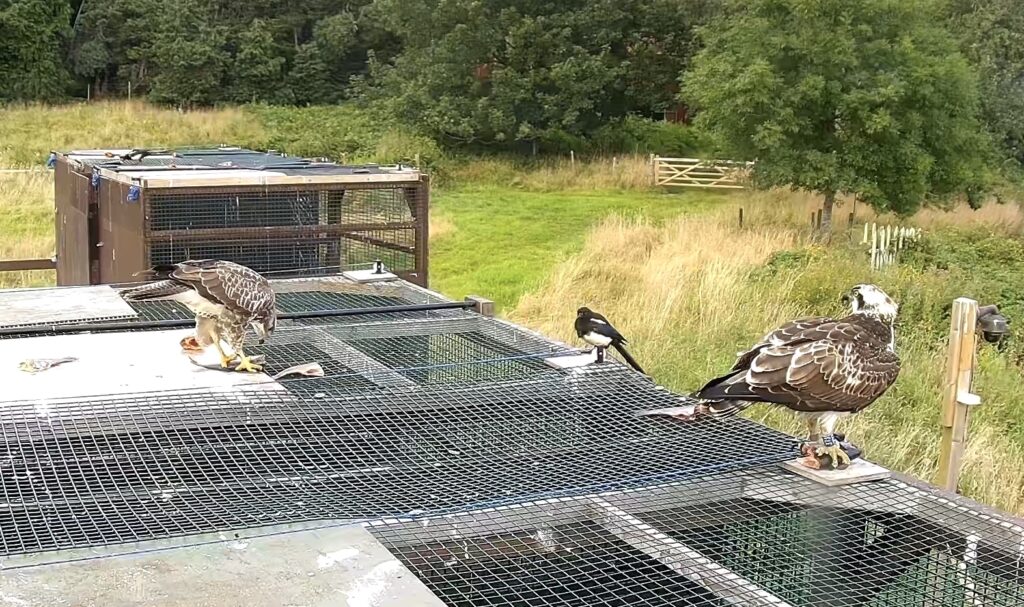With the safe fledging of the three Osprey chicks last week, we’re now entering the final stages of the 2023 Osprey season and are keeping everything crossed for an equally smooth migration for all three youngsters in around a month’s time. Of equal importance is the safe departure, migration, and hopefully return next season of our breeding pair, CJ7 and 022. To have them settled and producing young for the second year in a row is a great result for the project, and of course we now also have our newly returned young male 374 prospecting various harbour nest platforms, which bodes very well for next spring, when we could now quite reasonably expect to see two occupied Osprey nests in Poole Harbour.
5H3 sat in a nearby dead tree after fledging on Wednesday 19th July 2023 – Brittany Maxted
With this in mind, safeguarding these breeding adults is vital to securing the successful re-establishment of our South Coast breeding Osprey population. Therefore, given the ongoing Bird Flu situation nationally and the ongoing outbreak in Poole Harbour, together with the Roy Dennis Wildlife Foundation, we have decided that we will not be running our Osprey translocation project this year.
Ospreys are generally considered to be a low-risk species for such viral infections, as their ecology means that they are unlikely to come into contact with infected birds (of either the same or other species). While we can test any collected birds for infection before bringing them down together from Scotland, there is still a chance that they can contract the virus after they are released in Poole Harbour. During this post-fledging period, we continue to put food out for the translocated Ospreys several times a day for at least 4 weeks before they leave on migration, which not only draws them all in to close proximity, but also attracts in Magpies, Carrion Crows, Common Buzzards, and other Ospreys too. In previous years both CJ7 and 022 have visited the release site to feed on this food we’ve put out, and we believe this years wild fledged juveniles would also do the same. This mixing of many individuals and species is not a natural scenario for Ospreys, and it greatly increases the chances of transmission for Bird Flu, particularly from Common Buzzard which are a known carrier, attributing ~12% of all cases in wild birds across the UK since 2020 (where a case may refer to multiple birds in the same locality). In 2021, Common Buzzard were a regular visitor to the release site, often feeding right next to our released juvenile Ospreys, and it is this potential interaction that causes us greatest concern. Thus we feel that whilst there is an ongoing outbreak locally the only way to fully mitigate this risk of transmission to any translocated chicks, but also to our wild birds as well, is to not go ahead with the project this year.
Buzzard and Magpie feeding on the release pens alongside translocated chick 373 in 2021
This is of course a frustrating outcome and one that is unfortunately largely outside our control, however there are already successes to be celebrated this season. If all continues to go well, our three juveniles from the wild nest will depart safely at the end of August, representing a crucial contribution to the future Poole Harbour population: particularly those two males, who may well return to breed themselves one day.
Bird flu is another logistical challenge that often comes when working with wildlife, and one that must be worked through methodically and responsibly. This means continuing to work towards our objective of restoring a self sustaining population of Ospreys in Southern Britain, whilst also prioritising the wellbeing of the birds. With this in mind, we are already looking at ways to continue translocating chicks in coming years that mitigates the risks of Bird Flu and maximises the productivity for our developing Osprey population.
As always we will be working closely with our colleagues at the Roy Dennis Wildlife Foundation on achieving these goals, and are incredibly grateful for their ongoing support. And let’s not forget that thanks to their work with us and their partners at Forestry England, we now have both Osprey AND White-tailed Eagle breeding in the South England for the first time in over 240 years!
You might also like...
Harbour Update – posted 21/11/24
With heavy rain forecast for today, it was a bit of a surprise when we ended up with…
Find out moreHarbour Update – posted 20/11/24
A super cold start this morning saw the first proper frost of the autumn/winter, adding in the low…
Find out moreCall 01202 641 003
© 2024 Birds of Poole Harbour Registered Charity No. 1152615


